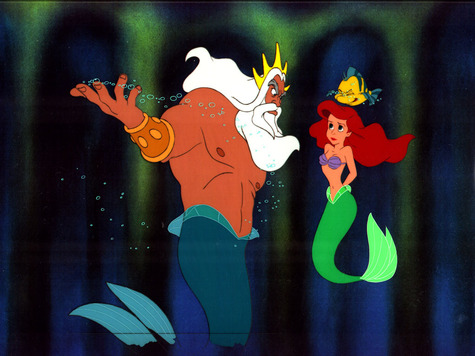Ariel's Body

Throughout the film it is hard to remember that Ariel is only sixteen years old. Ariel is depicted with extremely large, curvaceous hips, a microscopic waist, and big red pouty lips. The aquatic vixen exudes sex appeal as she rolls around on the ocean’s floor baring her midriff and only covering her chest with a purple shell bikini. Susan White, author of “Split Skins: Female Agency and Bodily Mutilation in The Little Mermaid,” says young girls adore Ariel because “she is unself-conciously beautiful, physically exuberant, and able to peruse her dreams of love” (183). Ariel’s body is a paramount focus of the film as she transforms from a mermaid to a human, which signifies the body’s importance.
Ariel knows that Prince Eric will never accept her as a mermaid, thus she seeks the help of Ursula, the evil sea witch, to turn her into a human. White believes “the urgency of the mermaid’s wish for the right body indicates that, despite her rebel status, it involves a social imperative” and it depicts “the proper body…as the most important element of her identity” (189). Ariel is willing to sacrifice her ability to speak and all ties with her family in order to transform her body to be more appealing for the prince. Through Ariel’s choice, Disney emphasizes the importance of a woman’s figure. Ariel is extremely, almost anorexically thin, from the beginning of the movie. The constant emphasis on the importance of a woman’s body throughout the movie alerts the audience that thin is desirable and women need to look good in order to attract a man.
In contrast to Ariel’s frail figure, King Triton is muscular, tanned, and a lot larger than she is. This reinforces the idea that women should be not only thin but also smaller than males while simultaneously alerting the males they should be strong and large. In her article “Men at the Heart of Mothering: Finding Mother in Finding Nemo,” Suzan Brydon says, “Female ‘heroines’ are drawn with delicate strokes of femininity and coquettishness; they have hourglass figures, flawless features and need their men” (131). Ariel is a perfect example of a delicately drawn heroine; however, her hourglass appears to be bottom heavy as her hips protrude a lot farther than anything she possesses up top.
Ariel knows that Prince Eric will never accept her as a mermaid, thus she seeks the help of Ursula, the evil sea witch, to turn her into a human. White believes “the urgency of the mermaid’s wish for the right body indicates that, despite her rebel status, it involves a social imperative” and it depicts “the proper body…as the most important element of her identity” (189). Ariel is willing to sacrifice her ability to speak and all ties with her family in order to transform her body to be more appealing for the prince. Through Ariel’s choice, Disney emphasizes the importance of a woman’s figure. Ariel is extremely, almost anorexically thin, from the beginning of the movie. The constant emphasis on the importance of a woman’s body throughout the movie alerts the audience that thin is desirable and women need to look good in order to attract a man.
In contrast to Ariel’s frail figure, King Triton is muscular, tanned, and a lot larger than she is. This reinforces the idea that women should be not only thin but also smaller than males while simultaneously alerting the males they should be strong and large. In her article “Men at the Heart of Mothering: Finding Mother in Finding Nemo,” Suzan Brydon says, “Female ‘heroines’ are drawn with delicate strokes of femininity and coquettishness; they have hourglass figures, flawless features and need their men” (131). Ariel is a perfect example of a delicately drawn heroine; however, her hourglass appears to be bottom heavy as her hips protrude a lot farther than anything she possesses up top.
If you missed Disney’s consistent attempts to persuade you that women should be beautiful, skinny, and small while men should be muscular, toned, and big, they graciously created a musical number in which Ursula blatantly sings you its corrupt message.
"Poor Unfortunate Souls"
Upon first watching this clip, it seems Ariel is slightly conflicted about giving up her voice. Ursula reassures her by saying, “You’ll never even miss it.” Ariel should never have been contemplating such a corrupt bargain in the first place because she should never have wanted to give up her voice, which represents her knowledge and her ability to speak up for herself and avoid a submissive lifestyle, in order to be with a man. As Ariel begins to contemplate the complications of being unable to speak, she begins to say, “But without my voice how can I,” before being abruptly cut off by Ursula’s reassurance that her looks will make up for her lack of verbal skills. Ariel should be concerned about losing her passions, which include singing; however, it appears she is going to inquire how she will make the prince fall in love with her in three days without a voice. Ursula then returns to further reinforce gender roles and says, “You’ll have your looks, your pretty face, and don’t underestimate the importance of body language” before shimmying and consuming the entire screen. Within this short forty second clip, the audience has learned physical beauty is the most important aspect of a girl.
Note: These are the same lyrics from the Disney animated film; however, the Broadway version has been applied over Ursula's normal voice. An original clip of the video was not allowed to be embedded.
At minute 0:39 in the video, Ursula shows Ariel two unfortunate souls she has helped in the past. The man is extremely scrawny and lanky while the woman is short and overweight. Ursula says they are "miserable," "lonely," and "depressed," which suggests they feel like outcasts because they do not fit society's ideal body types for their genders. Ursula then says the woman is "longing to be thinner" and the man "wants to get the girl," which further implies that in their current imperfect physical state, according to Disney, they will not find love. When Ursula helps them at minute 0:55, the man is big and muscular while the woman is very petite and has a tiny waist. The two newly transformed people are finally portrayed as being happy and embrace one another, demonstrating it took physical changes to make them happy and able to find love. Carefully listen to all of the words Ursula sings to your children during this catchy song.
Select lyrics from "Poor Unfortunate Souls"
[0:45]
“Poor unfortunate souls
In pain, in need
This one longing to be thinner
That one wants to get the girl
And do I help them?
Yes, indeed”
[2:29]
“The men up there don't like a lot of blabber
They think a girl who gossips is a bore!
Yet on land it's much preferred for ladies not to say a word
And after all dear, what is idle babble for?
Come on, they're not all that impressed with conversation
True gentlemen avoid it when they can
But they dote and swoon and fawn
On a lady who's withdrawn
It's she who holds her tongue who get's a man”
“Poor unfortunate souls
In pain, in need
This one longing to be thinner
That one wants to get the girl
And do I help them?
Yes, indeed”
[2:29]
“The men up there don't like a lot of blabber
They think a girl who gossips is a bore!
Yet on land it's much preferred for ladies not to say a word
And after all dear, what is idle babble for?
Come on, they're not all that impressed with conversation
True gentlemen avoid it when they can
But they dote and swoon and fawn
On a lady who's withdrawn
It's she who holds her tongue who get's a man”



